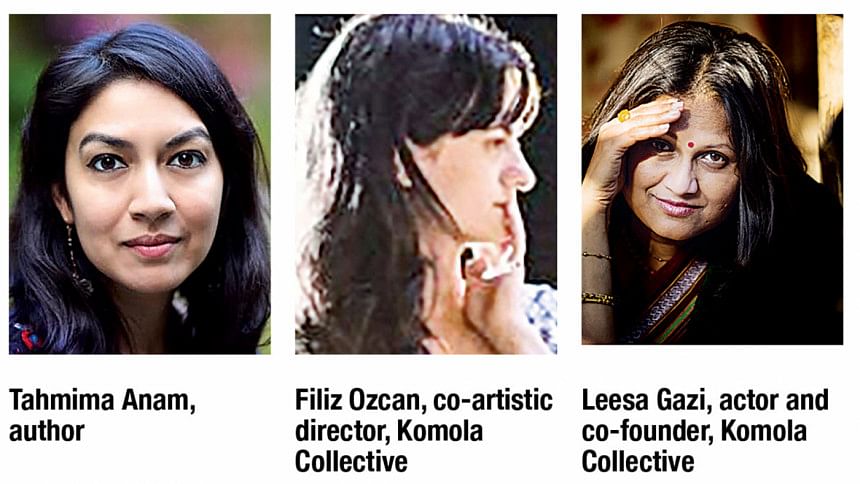On stories of domestic violence

Tahmima Anam's play Shahrazad, written for UK-based arts organisation Komola Collective and live streamed on YouTube on October 29, 2020, adopts the Arabian epic of 1001 Nights to explore the lives of survivors of domestic violence. The story follows an Indian woman named Shahrazad, whom her British husband Simon has "rescued" and renamed Zadie Brown. Zadie hosts a regular Instagram live show during the COVID-induced lockdown, in which she speaks to women about their various experiences, some positive, some sinister accounts of denial, dominance and violence. The experience allows Zadie to reassess her own circumstances.
We spoke to author Tahmima Anam, co-artistic director Filiz Ozcan, and actor/ co-artistic director Leesa Gazi about putting a play together virtually, as well as the ethics of dramatising domestic violence in fiction.
Sarah Bari/ Star Books: What inspired you to write this play? Was there a reason you chose this particular format of stories within a story?
Tahmima Anam: The idea of bringing the legend of Shaharzad into a more modern setting was Komola Collective's—they are really known for recasting traditional, inherited stories and myths. They commissioned me to write a play based loosely on the story of Shaharzad—a story about a woman who has to use her wits and her storytelling abilities to keep herself alive in an abusive relationship. I re-read the story of Shaharzad and decided that the main character would be a modern storyteller.
The format was inspired by 1001 Nights, in which the framing device—the young woman telling stories in order to stay alive—allows for a multitude of characters and stories that live within the larger narrative. I wanted Zadie to be confined within the four walls of her house and yet have the stories of other women weaving in and out so that although we never see her anywhere but at home, the world comes to her.
SB: As you said, it's usually the constraint of the larger, framing narrative in works like 1001 Nights which allows the multiple stories within to unravel. In Shahrazad you use the lockdown as this framework; but the other, literal constraint of the actors having to perform on a webcam makes it even more suffocating for the audience to watch. Was this deliberate?
Tahmima Anam: I didn't write the play to be performed online. My hope is that it will someday be staged (and be all the better for it). However, as it happens, having Zadie's monologues directed to the audience for much of the play actually works well on Zoom, because that is how her viewers would be experiencing her show. I do think the sense of claustrophobia was enhanced by the format, and we are going to have to find ways of bringing that sense to the stage when we finally can perform the play in front of an audience.
Filiz Ozcan: Camera shots of close-ups can feel very intimate, especially when the performer is talking directly to you. This approach draws you in even more as you connect with Zadie and what she is saying, especially when she talks about the impact of COVID. We played with the actors moving into the camera just before the sexual abuse to create a sense of no escape leading to suffocation. This is how women feel when they are trapped in their home with their abuser because they have no way out.
SB: Can you tell us about what went into putting this play together virtually? In addition to the challenges, did it in any way enhance the process and performances?
Filiz Ozcan: As a company, we had several meetings with our videographer Alex Unai on the technicalities of going live and which platform would be best suited for our play reading event. We also had to work in different time zones as one of our performers lived in Bangladesh. Even with two power cuts, one in the UK and one in Bangladesh, we were ready and it was an enjoyable experience. Tahmima Anam's writing worked perfectly on Zoom because the play was set in the world of online social media. I directed the domestic scenes between Zadie and Simon by changing the eye line to create an illusion that they were in the same room talking to each other.
SB: Shahrazad's name gives away the multiplicity of stories she contains within herself. But it's hard not to notice the irony in the name Simon has given her—Zadie Brown. Can you tell us what went into the choice of names for the characters?
Tahmima Anam: Zadie is a short version of Shahrazad. I think the thing about Simon is that he is a complex character—on the one hand, he wants to own Zadie, to possess her fully and keep her from the world. On the other hand, he is the one who comes up with the idea for the show, so in a way he's responsible for her transformation. So it makes sense that in choosing a new name for her, he would keep the spirit of the old name.
SB: Much of the violence in the play happens offstage. Was this a deliberate choice, and why?
Filiz Ozcan: This was Tahmima's choice, and I think it is very effective. You don't have to see the abuse to understand the violent act. The focus is on how Zadie finds ways to overcome this and keep going. So the focus is the survivor, not the perpetrator.
SB: Can you talk about your decision to end Shahrazad's story on a hopeful note (she seems to harbour no resentment for her former husband Ali) and the significance of closure in such stories?
Tahmima Anam: I wanted to give closure in the sense of Zadie's relationship with Ali but also keep things open in terms of Simon and Zadie. Through her friendship with Jasmine, Zadie realises the truth of her own situation, and decides to choose her freedom over her security with Simon. I wanted the audience to get a sense of Zadie's newfound strength, although we still have no idea how she will manage to get out of her situation.
SB: In the Q/A section of the screening, you mention earlier versions of the R&D process and how much each instalment has evolved. Can you tell us about the larger project this screening is a part of? In what ways have the stories involved?
Filiz Ozcan: The first stage took place in 2018 where we interviewed survivors of domestic violence with the writer Lucy Chau Lai-Tuen and worked with the company to explore ideas to find links between the stories of survival in the 1001 Night tales and the accounts of survivors of domestic violence. At the end of the first stage, the story was told through the daughter's perspective, who witnessed the abuse. In the second stage, we worked on Tahmima Anam's play informed by the same research work and idea. Tahmima's approach was to focus on the current pandemic and its impact on survivors of domestic violence.
We would like to tour this piece widely and reach out to different communities. We would like to continue working with women's organisations and charities who assist survivors of domestic violence. We would like to put together a series of outreach events similar to our live panel discussion 'Insights into Domestic Violence' and develop a series of workshops and conferences to raise awareness around domestic violence.
SB: How does one go about having these conversations with survivors of domestic violence in a sensitive way? And how does one navigate the ethics of retelling such deeply personal experiences?
Leesa Gazi: During the Research & Development stage of the Shahrazad project, we worked with domestic violence (DV) charities to get first-hand knowledge and insights into the DV situation. These charities and other women's organisations then helped us identify and contact survivors of DV. The survivors were willing to share their stories with us with the utmost valour to offer hope for fellow victims. Their stories and research material helped us immensely to explore experiences of DV survivors, and this shaped the outline of the entire project. We listened to survivors' accounts for better understanding in terms of how to approach the storyline. In light of the rise of DV cases worldwide during lockdown, we have felt that these stories need to be told more urgently than ever.
Filiz Ozcan: Right from the start of the project, we decided that we did not want to tell verbatim of these stories. We also had to be very clear with the women who shared their stories about how and when the material will be used. At any point, they had the right to withdraw their consent. Their accounts were used for rehearsal purposes, and their identity was anonymised.
The women [we spoke to] wanted to raise awareness around domestic violence and to reach a wider audience. The piece had an emotional impact on them. It also made other women question their relationships because emotional and psychological abuse is not as apparent as physical abuse. I have also heard of men checking in with their partners in regards to their relationships.
SB: Also in the Q/A part of the screening, you mention how the stories were keeping Shahrazad alive. How do you think storytelling helps survivors of domestic violence, and how is this affected by the form of storytelling involved, i.e. from reading to watching to exchanging stories? Do you think similar efforts could work for domestic violence survivors in Bangladesh?
Tahmima Anam: I'm not an expert on domestic violence, so I think it would be best to hear from those who have been working with women and learn more about how this particular fictional character may have some similarities with real women out there. I will say that the stories we tell ourselves are a fundamental part of who we are. Zadie tells herself that she has chosen her life, and in telling herself that, she ignores the abusive relationship with Simon. Once she starts to realise the ugly truth about her marriage, she has to come up with a way to tell herself a new story, and that is the moment that changes everything for her. She keeps telling her callers "your story is your power" and nowhere is it truer than in the case of Zadie herself.
Leesa Gazi: Sharing stories of courage, strength and purpose is not only powerful but also hugely motivational to people who are in desperate need to bring change in their personal life. Learning that you are not alone, that there are women out there who have gone through similar experiences of domestic violence (DV) and who have found the courage to seek help to come out of such a dire situation can provide solace and hope to survivors and encourage them to do the same to build a new life. The play Shahrazad is influenced by the tales of Arabian Nights underpinned by our research work with DV survivors and charities. I am a staunch believer in storytelling, and I sincerely think similar efforts could work in Bangladesh in terms of creating awareness.
SB: What's next for the project?
Filiz Ozcan: We will be looking to put together a tour and apply for funding for 2021 or 2022. It depends on when the theatres will open their doors again. In the meantime, the script will be developed further.
For more literary content, follow fb.com/DailyStarBooks and @thedailystarbooks on Instagram.

 For all latest news, follow The Daily Star's Google News channel.
For all latest news, follow The Daily Star's Google News channel. 



Comments